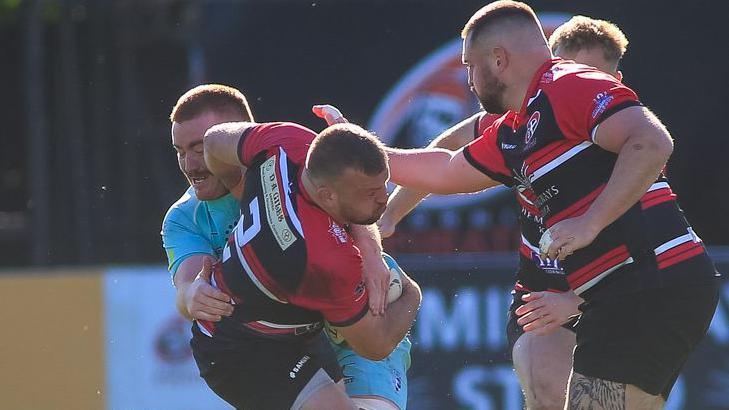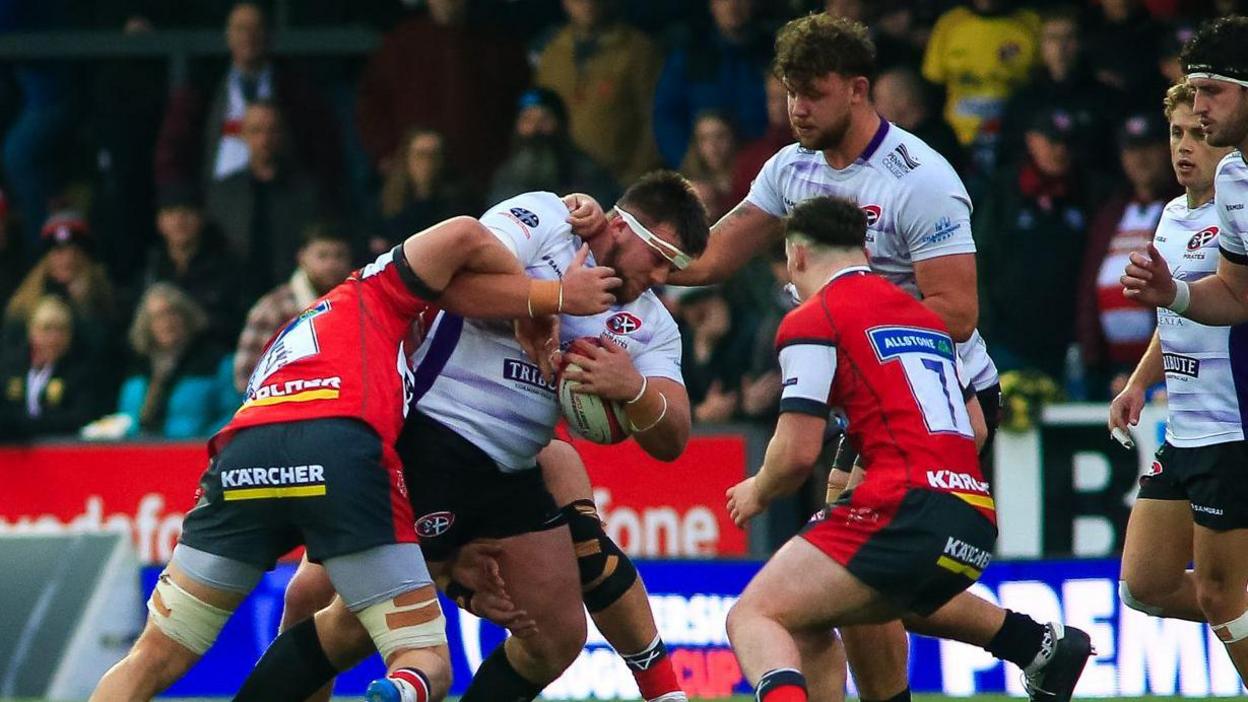Pirates chief calls on government to scrutinise RFU

Cornish Pirates finished second in the Championship last season
- Published
Cornish Pirates chief executive Sally Pettipher is urging the government to examine calls for a change of leadership at the Rugby Football Union.
Pirates, along with the 11 other clubs in the second-tier Championship, have called for a vote of no confidence in RFU chief executive Bill Sweeney and chairman Tom Ilube.
They are unhappy after Sweeney was paid a bonus of £358,000 despite the RFU posting a record operating loss of nearly £40m.
Sweeney - whose total remuneration was £1.1m - was one of six executives who shared a bonus pot of £1.3m at a time when the union is making more than 40 people redundant.
Championship clubs' funding from the RFU has been cut from £650,000 before the Covid-19 pandemic to about £150,000.
"One of the reasons for this extraordinary rise in his salary was for taking a pay cut in Covid," Pettipher told BBC Sport.
"I'm going 'so you have recovered from Covid perfectly happily, while your decision-making has crucified our club'.
"That matter of money has become what feels like a moral case as well as just a financial case."
In response the RFU told BBC Sport:
"The RFU ends this latest four-year cycle with a strong balance sheet, no debt, a robust cash position and positive profit-and-loss reserves.
"We always see losses in a Rugby World Cup year due to fewer home games and increased costs associated with attending the RWC. These revenue impacts were anticipated, planned for and are in line with expectations.
"The RFU has continued to invest strategically in the game at all levels and for the last two years the RFU has been working hard to develop a redesigned Championship with the aim of developing a whole-game solution to support the development of England Rugby.
"The objective has been to create a second tier that supports the English rugby system by developing young English talent, whilst supporting the clubs to become financially sustainable by growing local audiences, improving standards, and increasing the value of the league.
"Significant research has been undertaken and external independent advice sought to underpin the strategy. Minimum standards have been proposed along with increased RFU funding and a mechanic for promotion and relegation with tiered capacities for entry into the Premiership and a governance structure to give greater self-determination."

Cornish Pirates have lost to top-flight sides Gloucester and Exeter in the Premiership Rugby Cup this season
In September the 10 top-flight clubs reached a new agreement with the RFU in which funding of £33m a year will be split between them, and a promotion play-off being played between the bottom side in the Premiership and the Championship champions.
But there is yet to be any agreement on funding for the second tier, with Pettipher saying that before Covid-19 their RFU money helped cover about a third of the Pirates' budget.
The Penzance-based club are currently looking for new investment after long-time benefactor Dicky Evans ceased his funding as the Pirates ended plans for a new stadium in Truro.
Pettipher says the leadership at the RFU is too focused on the elite end of the game, to the detriment of the sport as a whole.
"It's not exclusively a remit to win England matches and fill Twickenham, but that is the remit that is working at Twickenham - a little binary planet system around that," she said before presenting a copy of a letter the club is sending to the RFU to the their local MP at Westminster.
"The legal structure of the RFU is a union of member clubs across England, and the argument is by creating more money here you support the game.
"That's fine except the money is going backwards and forwards between an ivory tower elite of Premiership clubs, England teams and then Twickenham. When is it coming out to the rest of the pyramid?"
Pettipher added: "Imagine this is an environmental argument and we've decided we are only going to protect the big beasts.
"We know that if the coral dies, if the bees die, if the trees die, we know in our ecosystem that you need all of this to feed the big beasts.
"But that does not appear to be in the leadership thinking of the union, which is responsible to government to govern its sport.
"We are simply one club - we have our own very specific difficulties that better governing decisions and better leadership decisions could rectify tomorrow.
"I'm asking government to put substantial scrutiny and pressure on their governing body to better govern their game."